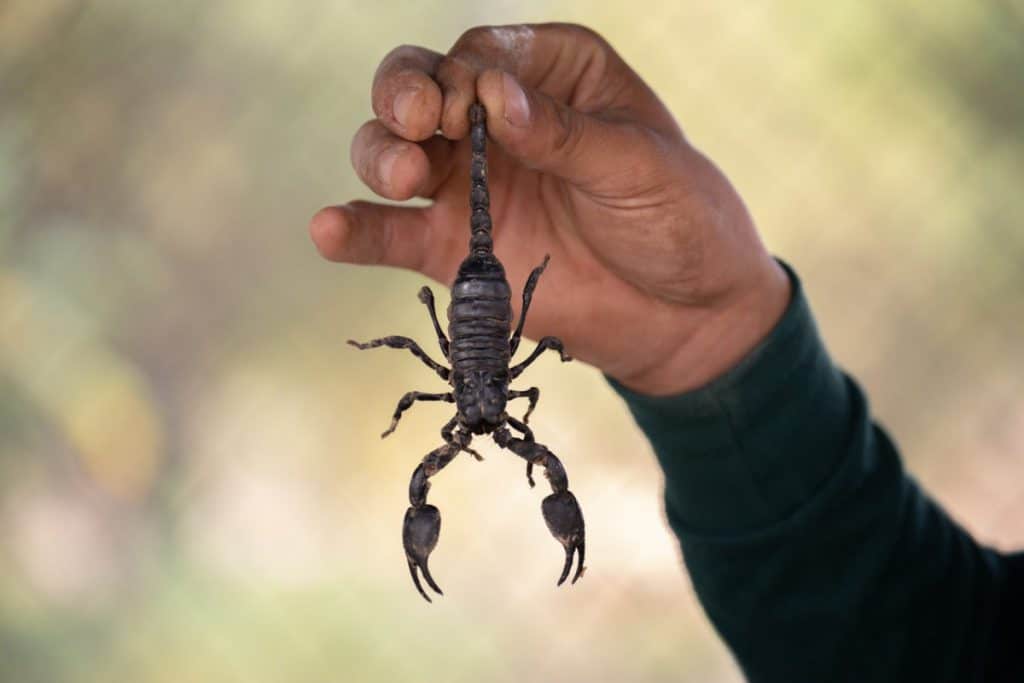
If you enjoy reading this article, why not check out our articles on What are the Biggest Bugs in America? and Best Insect Online Games & More!
How Deadly Are Scorpions?
Dangerous, or Given a Bad Rap?
When thinking of animals that elicit fear in humans certain ones stand-out as giving lots of people the heebie-jeebies. Spiders, sharks, snakes, and scorpions all start with the letter, “S,” and all carry with them the ability to cause a whole lot of people to get nervous or freak-out! Many of these creatures somewhat unfairly get a bad rap, however, and scorpions are no exception.
Despite many a phobia relating to Scorpions, out of 1,750 or more species, only about 20-25 are actually potentially fatal to humans if they sting. Out of that number, many species are closely linked, making it so that besides some minimal variations there are maybe 7 that are worth discussing as especially notably deadly to humans. With this in mind, it is worth discussing which scorpions should cause concern, and if they are not as deadly as we thought it is good to discuss how they actually do succeed at hunting and surviving.
How Do Scorpions Hunt?
Scorpions actually do not always use their venom when hunting. They will instead rely on speed, strength, and the ability to tackle and grab prey with their pinchers. Once they have caught ahold of a meal they will proceed to grip it tightly enough to start crushing its body and sting it as needed (often without venom) to immobilize their prey. Scorpions will often eat insects, spiders, or even other (smaller) scorpions. Larger scorpions will even eat frogs, lizards, rodents, and sometimes snakes!
Scorpions generally only need to hunt every 2-3 weeks and some are able to survive months without food if needed. Basically, with its fast speed and strength, the ability to have venom is more-so meant as a defensive mechanism and is used as such. Should a large predator try to eat a scorpion (like a wolf, fox, etc.) that is the time it will utilize venom to prevent its own death.
Hence, should a human handling a scorpion make it feel threatened, that would be a time it may use venom, and assuming it is of the small amount that could be possibly deadly towards humans, then there is a risk. Therefore, fearing that every Scorpion could kill you is just going to bring a lot of unneeded stress. It should still be established however, just which Scorpions can kill you?
We’ve talked a little about what scorpions don’t like and what makes them uncomfortable, but what exactly do scorpions like? Find out in What Are Scorpions Attracted To?
Which Scorpions Can Kill You
When it comes to scorpions that can kill a human, some are more deadly than others. Their venoms are neurotoxins and/or cardiotoxins that can have varying effects, from the more minor (relatively speaking) being intense pain, diarrhoea, and vomiting. More severe reactions can include paralysis, difficulty or inability to breathe, and death. The 7 to consider (in no specific order) are…
The Spitting Thick-Tail Black Scorpion
Notable for being relatively sizable compared to the other scorpions on this list, The Spitting Thick-Tail Scorpion is able to basically, “Spit,” its venom at a potential threat up to three feet in distance. Should a human get this in their eyes it can pose a severe risk of permanent damage and even blindness. Therefore, it is key to keep one’s distance from a Spitting Thick-Tail Black Scorpion!
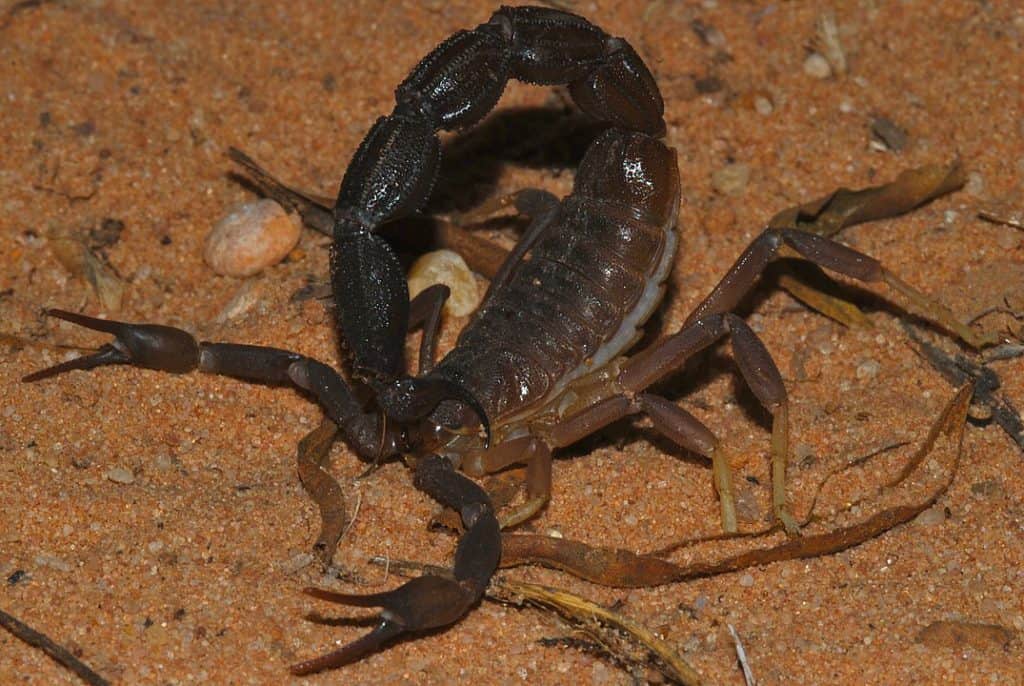
Yellow Fat-Tail Scorpion
Despite being potentially deadly to humans if it stings them, the Yellow Fat-Tail Scorpion is actually quite popular when it comes to the exotic pet trade thanks to its eye-catching appearance and how it is known for being extremely hardy–while most creatures would hide in a sandstorm the Yellow Fat-Tail scorpion has an exoskeleton that can withstand the strongest and most damaging sandstorm winds.
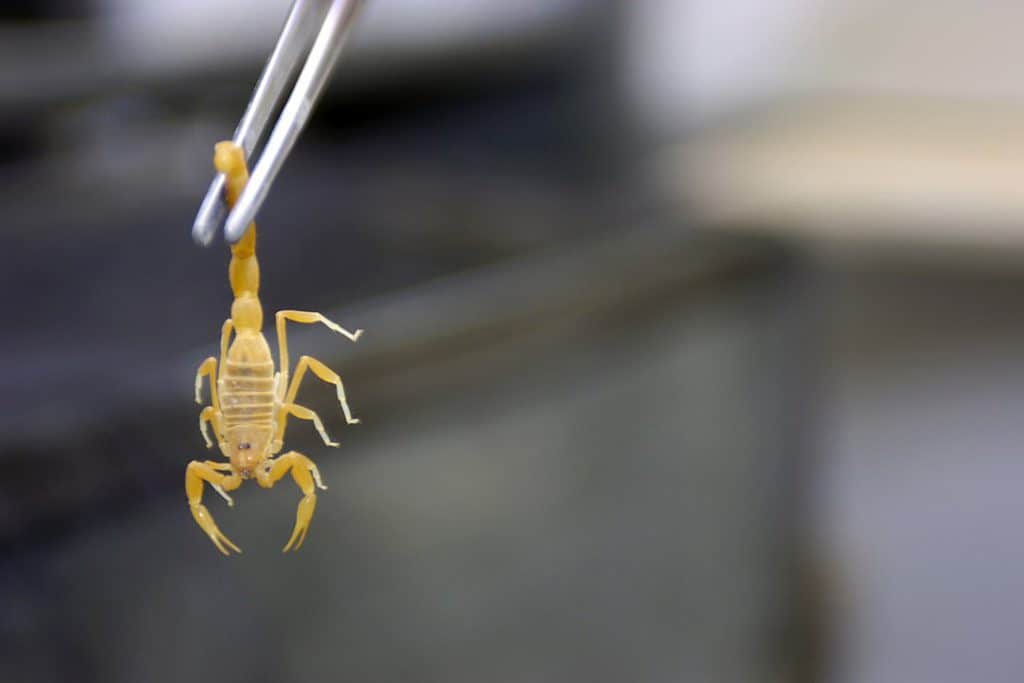
Arizona Bark Scorpion
Thanks to having an antivenin which can counteract the effects of the Arizona Bark scorpion it has been decades since a death has been officially recorded from one. With that said, this scorpion’s venom apparently feels like electric jolts when coursing through the body, so even if medical treatment can drastically reduce the risk of death (up to 25% when stung depending on someone’s general health) it still is not a good idea to go seeking-out the Arizona Bark scorpion!
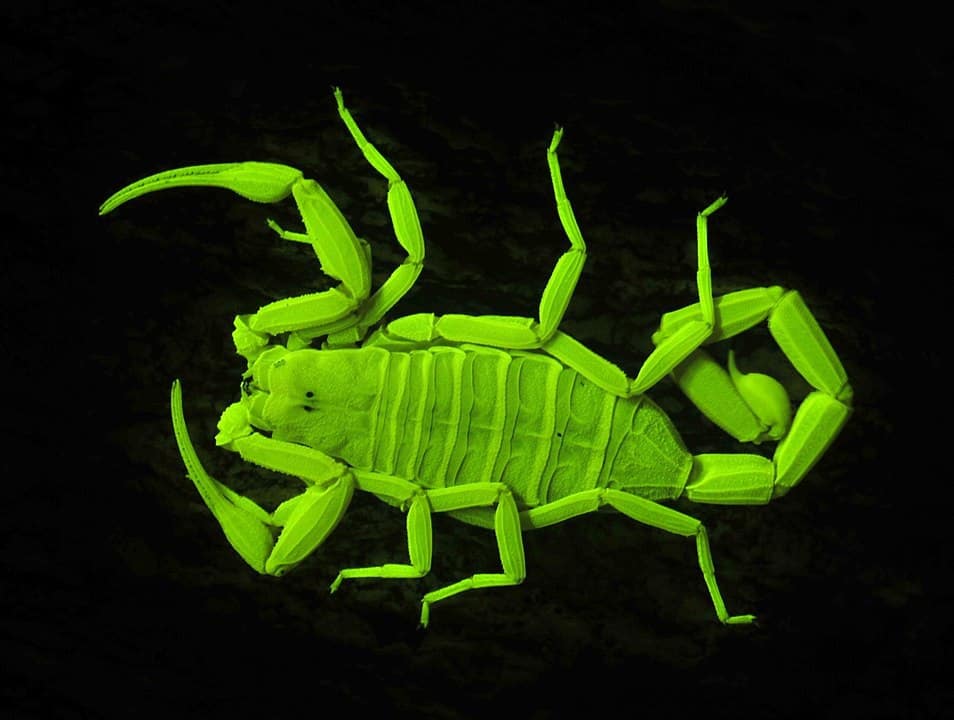
Arabian Fat-Tailed Scorpion
The Arabian Fat-Tailed scorpion is a major concern in the regions it inhabits (it often found in parts of Africa as it further discussed below) due to its being quite venomous and very aggressive. This mixture of potent poison and short-temper results in it making-up 80% of stings and possibly 90% of deaths (from scorpion stings) within the region of North Africa. The Arabian Fat-Trailed Scorpion is not to be trifled with!
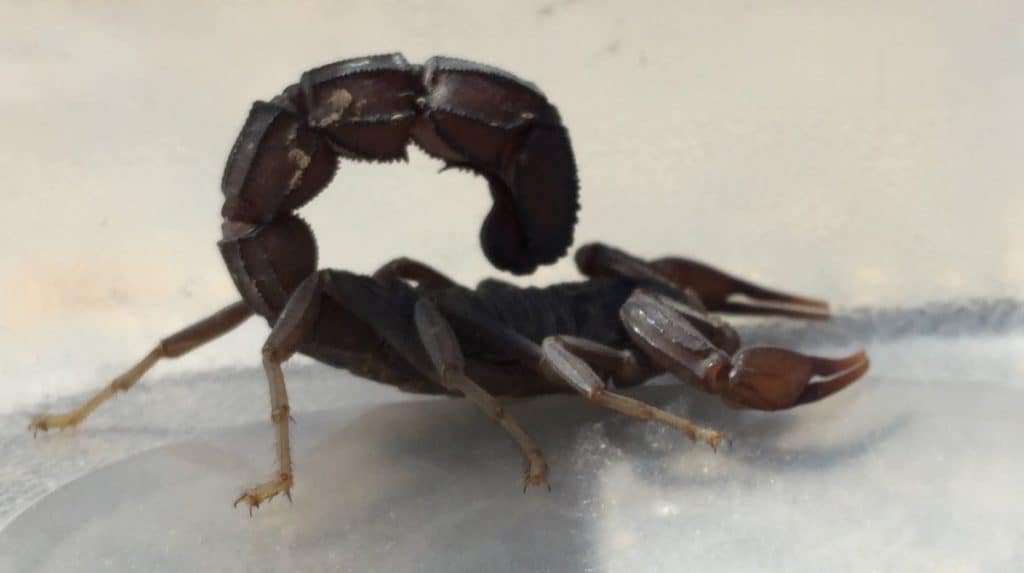
Brazilian Yellow Scorpion
While the Brazillian Yellow scorpion may be quite venomous, it has been recorded to actually use its venom generally sparingly, only when it absolutely believes its life may be threatened as opposed to if it is simply perturbed. It still has contributed to deaths in children and the elderly who can be especially sensitive to its toxins, however. Its cardiotoxic venom has been found to possibly lead to heart-failure in bodies that are not able to handle it due to being of smaller size or prone to ill-health.
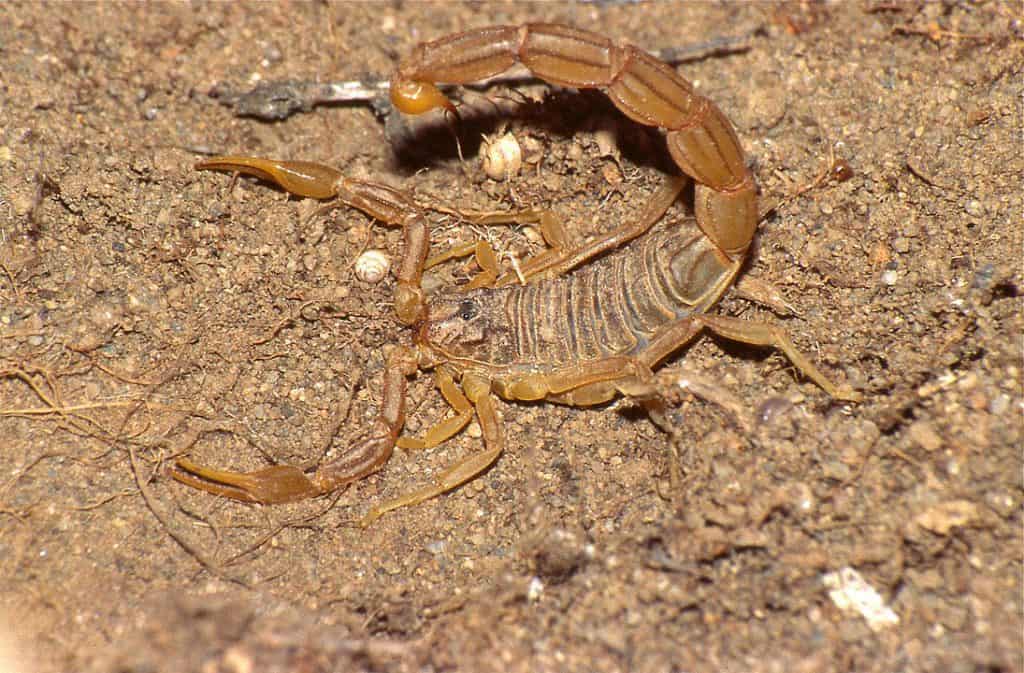
Deathstalker
It may be the smallest scorpion on this list when fully-grown at a tiny 2.5 inches, but the Deathstalker more than makes-up for its shirmpy stature with a nasty blend of neurotoxins and cardiotoxins that cause pain that even in healthy grown adults can be described as, “Excruciating.” Tiny but mighty!
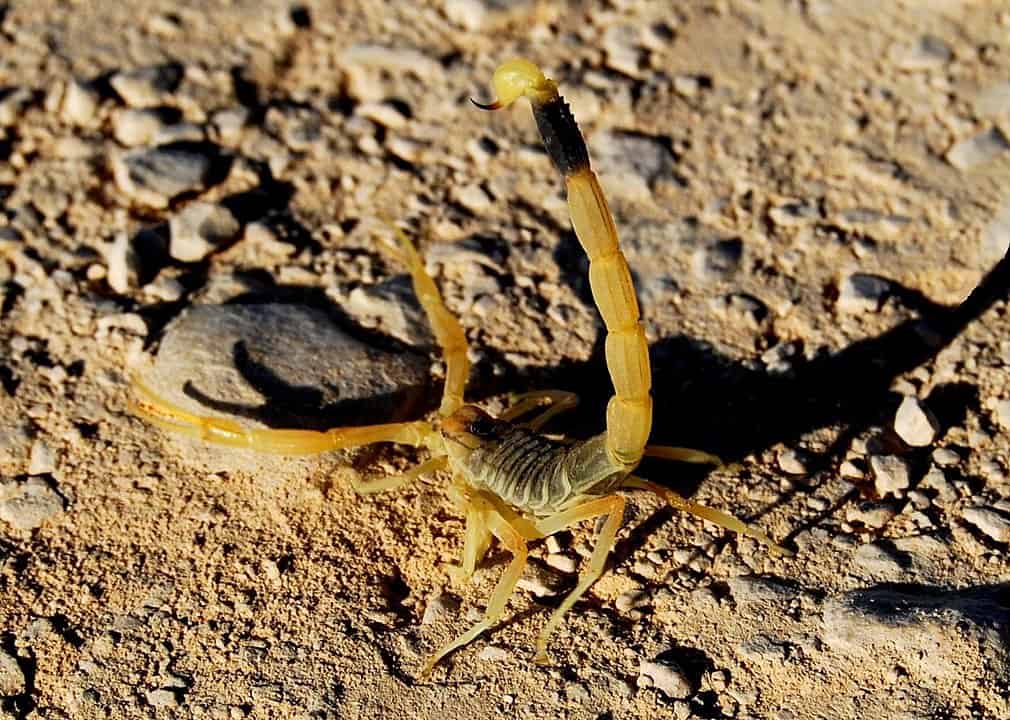
Indian Red Scorpion
Thanks to its striking bright-red color the Indian Red scorpion is like one big, “Warning,” sign. More commonly spotted at night when it emerges to hunt, the Indian Red scorpion’s main risk is it delivers a lot of venom when it does sting, and this–as always–is a big concern for humans who are very young or very old.
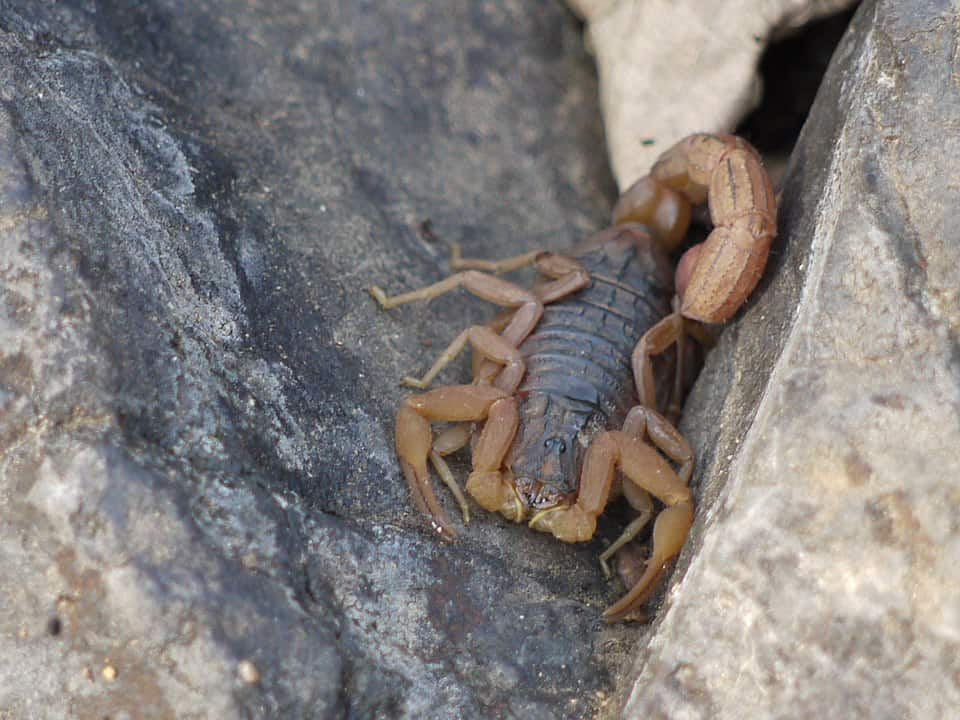
The Most Poisonous Scorpions
Out of the listed scorpions above, the most deadly to humans are those that are of the, “Fat-Tailed,” genus. In fact, as was earlier said (and bears repeating) the Arabian Fat-Tailed scorpion is estimated to contribute to 80% of stings and possibly 90% of deaths (from scorpion stings) within the region of North Africa. As for what the Fat-Tailed scorpion’s poison does to a human body, it has fast-acting venom which goes and attacks the CNS (central nervous system), which can result in paralysis and even respiratory failure–e.g. you stop breathing.

Also, the Yellow Fat-Tail is extremely deadly as well, with the same results as the Arabian Fat-Tail if it stings someone, and that risk is without a doubt higher considering how (as discussed) it can be popular as an exotic pet and handled often. The Indian Red Scorpion has been argued by some to equal the Fat-Tailed genus due to some particularly nasty side-effects of pulmonary oedema AKA fluid in the lungs, but at the end of the day, it can be agreed upon by everyone that getting stung by any of the scorpions on this list would make for a bad time!
Where the Most Dangerous Scorpions Live
A good deal of the most dangerous scorpions is found in the regions of Africa and Asia. The Spitting Thick-Tail Black Scorpion, Yellow Fat-Tail scorpion, Arabian fat-tailed scorpion, Deathstalker, and Indian Red scorpion are all found in this swath of land. Meanwhile, the Brazilain Yellow scorpion is a resident of Brazil. The Arizona Bark Scorpion is the sole deadly scorpion on this list found in North America, making it the de-facto deadliest in the region. As its name indicates, you can often find it within the deserts of Arizona, although it can often be found as well in California in Utah.

Ever wonder where the most poisonous spiders live? We’ve got an article about that: Which Spiders are Poisonous in Certain States (and Canada)?
Are Baby Scorpions More Dangerous Than Adults?
This is actually a really common misconception that has some accuracy and a lot of falsehood to it. The main issue with baby scorpions is that before they have their first molt they are very soft and mostly defenseless. They are unable to hunt and rely upon their mother to keep them fed as they lack especially strong pinchers or even a skillful and sharp stinger. The only thing baby scorpions have going for them is their venom.
Hence, should they feel the need to defend themselves they will not hesitate to sting in a panic and release all of their venom in an effort to ward off a predator and stay alive. As they are smaller and less-developed they don’t have as much venom as a fully grown scorpion and it is not as powerful/concentrated…but it is all of it that they do having being injected into whatever they think is threatening them. For that reason, there is a risk from a baby scorpion sting if you’re dealing with scorpion species that’s deadly towards humans. Also, the fact that one baby scorpion often means a bunch could be around (all together awaiting food from a mother) could result in a whole lot of baby scorpions suddenly stinging someone with all their venom. Should that happen this is clearly not a case of, “The more the merrier,” so much as it is, “The more the most likely deadlier.”
Does a Bigger Scorpion Have More Poison?
You might be tempted to think the bigger the Scorpion the more risk it poses to a human. Well, you’d be wrong! Many of the biggest species are actually much less dangerous to humans than smaller ones. This stems from the fact that without a powerful a venom to use for self-defense these scorpion species arguably needed to be bigger to ward-off threats (including other scorpions as oftentimes the biggest and strongest one wins in a fight). Species that are not quite as large and very poisonous are able to rely on their venom for self-defense and just need to be large and strong enough for hunting or fighting-off competing scorpions. Hence, the most dangerous scorpions are actually generally 10CM or less in length when fully grown, with the exception to this being the aforementioned Thick-Tail found in parts of Africa. It can grow to a bit more than 10CM
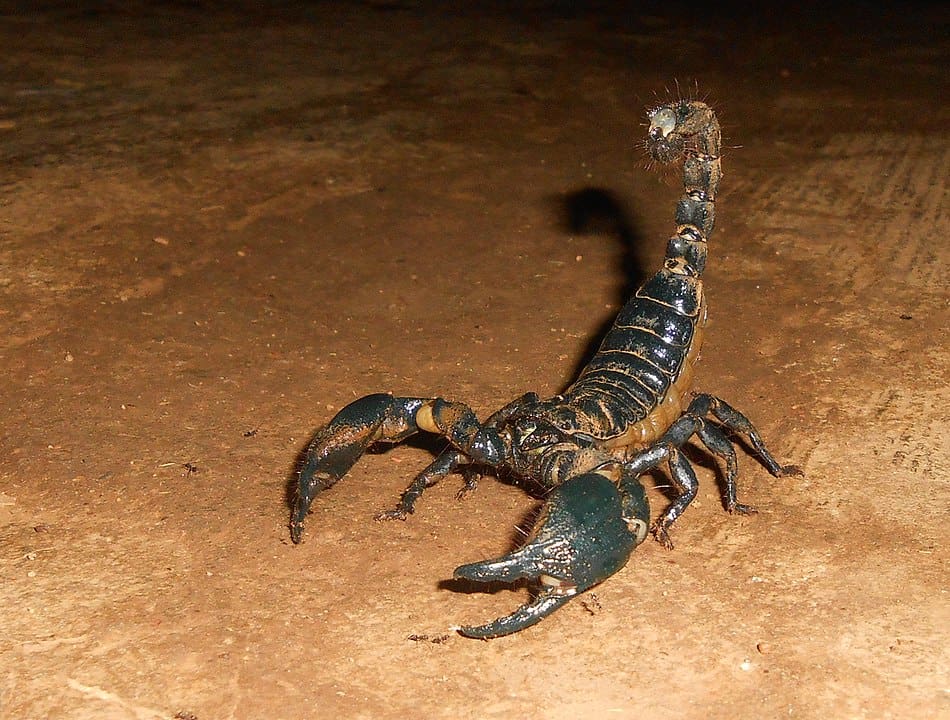
Conclusions
It is clear that scorpions are somewhat unfairly targeted with negative perceptions of them all being dangerous and deadly. In actuality, only an incredibly small number of the 1,750-plus species in existence is deadly to humans.
Now, it is of course obvious the sting from any scorpion can be painful and bring with it some nasty side-effects, but the wrongheaded portrayal of all scorpions as monstrous people-killers is false. It is wise to be aware of the kinds that can potentially kill an individual, but whether dealing with a deadly or, “Harmless,” scorpion it is always best to carefully admire them from afar. Just rest assured if one does happen to ever sting you, the chances are it will not be lethal.
If you enjoyed reading this article, why not check out our articles on Insect’s Roles in Christianity and Judaism and Do Ladybugs Build Nests?
Recent Posts
Tiny Black Bugs in Bathroom NO WINGS: What They Are and What to Do!
Finding tiny black bugs in your bathroom can be uncomfortable, to say the least. Especially if they are persistent, or they appear in very large numbers, which they often like to do. When it...
Tiny Black Bugs in Plant Soil - What Are They & What To Do About It
A short horror story: You get a new houseplant. You do your best to take care of it. You’ve ensured that it has the right soil, the right amount of sun, it gets enough water. And then one day, you...

